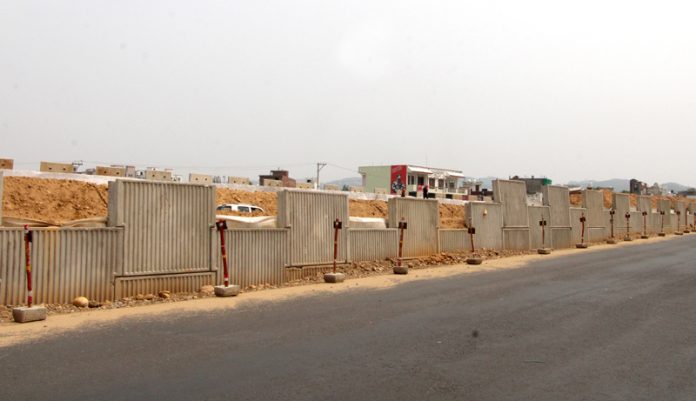The construction of the Kunjwani-Narwal flyover in Jammu, characterized by its blind walls, has sparked significant controversy and discontent among local traders and residents. Despite continuous protests and appeals from the community, the NHAI continues to forge ahead with the project. The NHAI officials claim that they have not received any written instructions to halt the work, highlighting a communication gap that is exacerbating the issue. The decision to construct the flyover with blind walls was made during the preparation of the DPR for the Delhi-Katra Expressway. This decision, made at the planning stage, has now become a point of contention as the project moves into execution. NHAI officials assert that they are merely executing the plans laid out in the DPR. However, this rationale has not been well-received by the local community. The flyover’s blind walls are perceived as a significant impediment to local businesses, residential areas, hospitals, and schools situated along the route. The local populace is understandably concerned about the potential negative impact on commerce and daily life, arguing that a pillar-based flyover would have been a more suitable alternative for the densely populated area.
The NHAI’s stance is that altering the flyover design at this stage would lead to substantial cost escalations and delays. Contracts have been awarded, and considerable progress has been made with casting and fabricating works. Changing the design now, they argue, would disrupt the project timeline and inflate the budget. This position, while technically and economically sound from a project management perspective, fails to address the socio-economic repercussions for the local community. The traders and residents, whose livelihoods and daily activities are directly impacted, feel ignored and marginalized in the decision-making process. Their appeals for a design review reflect a deep-seated frustration with what they perceive as an unresponsive and indifferent bureaucratic system. The local leadership, including the Jammu Chamber of Commerce and Industry, has been vocal in their opposition to the current flyover design. Meetings with Union Minister of Road Transport and Highways, Nitin Gadkari, and other high-ranking officials have so far yielded little in terms of tangible results.
The whole episode highlights a critical aspect of this controversy: the perceived disregard for public sentiment and the lack of adequate consultation with local stakeholders during the planning stages. The flyover, intended to facilitate smoother transportation, has instead become a symbol of public disenfranchisement. The ongoing protests and appeals for intervention underscore a broader issue of accountability. The NHAI’s failure to address the community’s concerns satisfactorily points to a need for more transparent and inclusive planning processes. Infrastructure projects of such magnitude and impact should incorporate comprehensive stakeholder consultations to ensure that the benefits are maximized while the adverse effects are minimized. Furthermore, the situation calls for urgent intervention from higher authorities. The Union Minister’s previous engagement with the issue must translate into concrete actions to mediate a solution that balances economic feasibility with public welfare. The traders and residents deserve a clear, authoritative response that addresses their concerns. The way forward is a dialogue that bridges the gap between the executing agency and the affected community. A potential solution could involve revisiting certain aspects of the project to incorporate design modifications that mitigate the negative impacts on local businesses and residents. This might include partial redesigns or the incorporation of features that enhance connectivity and visibility for the affected establishments.
This Kunjwani-Narwal flyover controversy serves as a serious reminder of the complexities involved in urban infrastructure development. While economic efficiency and timely project completion are crucial, they should not come at the expense of community welfare and public trust. As the protests continue, the NHAI and the relevant authorities must demonstrate a willingness to listen, adapt, and ensure that the development ultimately serves the best interests of all stakeholders involved.


